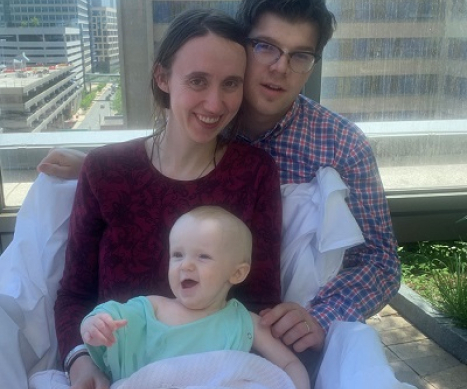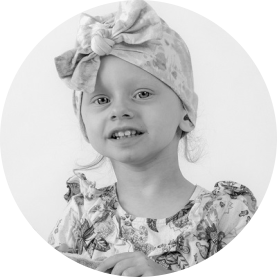- Neuroblastoma





Click the images to see them larger above!
Learn more about
Neuroblastoma
Get the facts about Neuroblastoma and how our research projects are making a difference.
Learn More »Mary Judith is the happiest baby girl. She’s a big fan of playing Peek-a-Boo, being held, and going puppy-spotting with her mom. She likes all animals, and even shrieks with excitement when she sees big animals like cows. She is not a fan of being cold after bath time, and she especially hates getting her blood pressure taken.
For the first few months of her life, Mary Judith would hardly ever cry and could almost sleep through the night. But at 4 months old, she began having some fussiness and digestive issues. While simple fixes helped her tummy, the fussiness only got worse. At first, her parents thought it could be the pain of teething and gave her Tylenol, however, months passed and her teeth still had not grown in.
When Mary Judith was 6 months old, the family went on vacation, and she had a period of unexplained, inconsolable crying. Her sleep worsened and the pediatrician assumed it was a virus. Eventually, she could no longer tolerate being in a stroller or focus on any activities. She couldn’t sleep, her appetite for new foods and breast milk disappeared, and in May 2024, she vomited for the first time. Another visit to the pediatrician gave her parents sleep advice, but no answers, and when she threw up for the second time, they went back the second day in a row. The doctor palpated Mary Judith’s tummy, which caused her to scream. When her mom did it, she screamed yet again.The doctor recommended going to the ER for an ultrasound of her intestines “hoping it was nothing.”
A few minutes later they were at the ER, and the ultrasound technologist asked about Mary Judith’s stool and noted that it was abnormal. The doctor then checked her kidneys, which they would not have done otherwise. A radiologist came to talk to the family and said Mary Judith’s kidneys were swollen, looked at her ureters, and found a huge mass. Mary Judith’s parents were told it was likely neuroblastoma, but that it had a good prognosis if found within the first year of life. The next day, an MRI confirmed the tumor.
“The horrible image of that tumor surrounding our daughter’s spine is forever burned into our memories,” said Andrew, Mary Judith’s dad.
Mary Judith was discharged that same day with a biopsy scheduled later that week. Over the next few days, she suffered from a terrible diaper rash and was difficult to rouse from sedation, among other painful symptoms. On May 12, 2024, Mary Judith was rushed to the hospital because she was unable to support her weight or stand. Doctors thought she might need emergency neurosurgery but decided against it, citing pain as the reason for her decreased mobility. Her rate of decline pushed the biopsy a day forward, when she also received a bone marrow biopsy and a subdermal port placement. Although the night before was difficult, the surgery was successful, and the biopsy confirmed intermediate risk neuroblastoma. The next day she began chemotherapy. Mary Judith was 8 months old.
Today, Mary Judith finished her third round of chemotherapy at Memorial Sloan Kettering (MSK). She has surgery to remove her tumor on August 15 which will be followed by more chemotherapy.
Mary Judith’s parents are hopeful that the upcoming surgery will remove as much of the tumor as possible without damaging the blood vessels and nerves that it surrounds. They also hope that the potential kinase inhibitor treatment will be successful so that their daughter doesn’t have to endure further chemotherapy or radiation. Ultimately, they hope she will be cancer-free with no relapse.
Despite all that she’s been through at such a young age, Mary Judith is Andrew’s hero because she remains kind and sweet through everything and continues to share her toys.
“She makes everyone smile,” Andrew said. “She even waves at nurses while crying and being poked with painful needles. She has a joy and innocence that is a true model of sanctity.”
He wants other families to know that it is always wise to get a second opinion from a top pediatric cancer hospital. “There is a huge difference in treating a rare cancer when at a place like MSK where rare cancers are not so rare,” he said.
To Andrew and his family, the hero stories on the Alex’s Lemonade Stand Foundation website have been helpful to hear. The family plans to look into the Foundation for resources as time goes on. They have faith in organizations like these that push for cures and treatments for rare childhood cancers.
Information provided by Andrew, Mary Judith’s dad
Updated August 2024
Donate in Honor of Mary Today!
Your donation helps to fund critically-needed research to find better treatments and cures for children with cancer.





